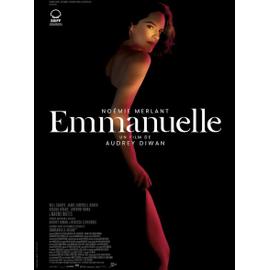
A remake of Emmanuelle: the most ridiculous IP in the world to exploit. Who even knows this film today, apart from people who are no longer the target audience for a 'reboot' and a tiny circle of cinephiles aware of its success but who haven’t actually seen it? Absurd. Directed by Audrey Diwan: a severe case of industry hype, where she now co-writes half the French films in production, none of which particularly stand out, and is made into a media darling based on one film (which I found rather unimpressive) that brought in 130,000 viewers. Starring Léa Seydoux: I can see the appeal on paper, but again, this is the industry talking to itself. She doesn’t have a real-world audience. However, she was enough of a star that the idea of her doing erotic scenes might spark interest. With a €20 million budget: ?!?!?!
Everything seemed irrational. Then Léa Seydoux was replaced by Noémie Merlant, and I don’t mean to be disparaging. The crash was evident after that: no festival selections, a dismal poster, promotion treating it as an event film when it clearly wasn’t, this association with eroticism with an ill-fitting promotional narrative. And so, we end up with an absolute flop that will close out at around 70,000 viewers.
Indeed, the idea of making an erotic film in 2024 is tricky, but perhaps that’s what could have made it stimulating. Because the place of sex in collective life has fundamentally changed. There are statistics showing that people are having less sex, while at the same time, sex and nudity are disappearing from screens, and when sex is discussed publicly, it’s mostly in the context of assault, harassment, incest, abuse, etc. Individual sexual freedoms are framed as ‘rights’ that the state must guarantee, akin to unemployment insurance. In short, we are in an era of societal asexualization, paradoxically juxtaposed with sex being more omnipresent than ever: you can find someone to hook up with in three minutes in virtual marketplaces, pornography is free and plentiful, and you can instantly see millions of naked people or people having sex, including celebrities. So cinema finds itself in a difficult position. It’s the art form of popular culture, and thus is on the front lines of knowing that neither audiences nor actors are particularly interested in sexual content on screen anymore. It’s a collective art form, while sexual content is now consumed alone on a computer or phone. It embodies a collective imagination, while tags allow viewers to tailor their viewing to the extreme.
Faced with this deadlock, there are three options: 1/ drop the topic and wait for better days. 2/ don’t overthink it and just find the right formula, the right buttons to press to excite audiences. 3/ incorporate all of this into a thoughtful response. Needless to say, Audrey chose option number 3, gifting us a spectacular filmed essay on intention for €20 million. It’s actually one of the most striking recent examples of this approach, as there is no plot, and the few narrative elements serve solely to align with an intellectual theory. The era is sanitized --> it’s set in a luxury hotel where everything is spotless and nothing stands out. Sex is a commodity like any other --> there’s an escort selling sex at the hotel as casually as a jacuzzi session, and Emmanuelle herself tests sex like she would any other service. Desire is gone because everything is always available --> she is frigid. And that’s true for everything. Thus, it neglects the basic elements of making a film that vaguely appeals to an audience. Starting with Emmanuelle. I don’t want to trash Noémie Merlant, who is a good actress, but having her lead a film about desire is absurd. She looks sullen throughout. She has a dreadful job that aligns with Audrey’s theories but makes for a main character who is detestable, someone you don’t want to sleep with, spend two hours with, or even have a conversation with at a hotel bar. Following the escapades of an unsympathetic frigid woman tasked with inspecting luxury hotels and finding reasons to fire people is boring; whether she ends up climaxing or not is irrelevant to me. The hotel, where we’re stuck for 1 hour and 25 minutes, is lifeless. Are there people who like this type of industrial, anonymous hotel with vulgar, ostentatious luxury and a 1% clientele that always looks miserable? No. So, once again, I understand the theory, but from a human perspective, the movie makes you spend two hours in an ugly, oppressive space. It’s deliberate, and I’m glad Audrey found it interesting, but I didn’t come here to suffer, okay?
This avalanche of intentions, which actively makes the “user experience” (
I also chuckled thinking of her apology over the non-selection at Cannes, where she said she needed three more weeks of editing. Watching the finished film leaves one wondering: with its 37,534 inserts of hotel elements, the endless wandering around Hong Kong at the end, the endlessly repetitive quality control scenes... it’s two hours that feel like four, and while no edit can hide the lack of stakes or story, the version Thierry saw must have been something else.
In short, a complete failure, and like with Drone, we’ll end up with analysis that goes, “Ah, but erotic (thrillers) don’t work, look at Emmanuelle,” when it’s neither a thriller nor an erotic film. So if she wanted to write her dissertation on the absence of pleasure, focusing on ensuring the audience experiences none, just like her character, maybe she should have done it for €4 million in private.